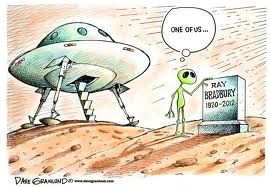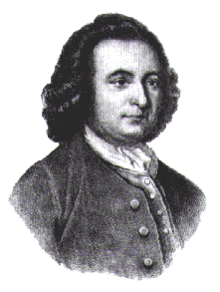“I don’t try to predict the future, I try to prevent it.”
~Ray Bradbury~
Ray Douglas Bradbury, August 22, 1920 – June 5, 2012

Bradbury died in Los Angeles, California, on June 5, 2012, at the age of 91, after a “lengthy illness”, coincidentally during a rare transit of Venus
My earliest memory of Ray Bradbury was my father reading to me from The Martian Chronicles. I was three. Later he would read aloud from Fahrenheit 451 and his short stories while I looked on at the words on the page. I read from those same books that were left to me by “Pop” to my daughter and gave her my first edition copy of “Something Wicked This Way Comes” which “Pop” gave me for my 15th birthday.
Ray Bradbury, Who Brought Mars to Earth With a Lyrical Mastery, Dies at 91
By many estimations Mr. Bradbury was the writer most responsible for bringing modern science fiction into the literary mainstream. His name would appear near the top of any list of major science fiction writers of the 20th century, beside those of Isaac Asimov, Arthur C. Clarke, Robert A. Heinlein and the Polish author Stanislaw Lem. His books are still being taught in schools, where many a reader has been introduced to them half a century after they first appeared. Many readers have said Mr. Bradbury’s stories fired their own imaginations.
More than eight million copies of his books have been sold in 36 languages. They include the short-story collections “The Martian Chronicles,” “The Illustrated Man” and “The Golden Apples of the Sun,” and the novels “Fahrenheit 451” and “Something Wicked This Way Comes.”
Though none of his works won a Pulitzer Prize, Mr. Bradbury received a Pulitzer citation in 2007 “for his distinguished, prolific and deeply influential career as an unmatched author of science fiction and fantasy.”
Scarecrow gave this tribute to Bradbury’s memory by reminding us of what could happen in a totalitarian society like the one in Fahrenheit 451:
In Fahrenheit 451, Bradbury describes the horrors of a totalitarian society so repressive and fearful of ideas that it banned books and burned them. But clever humans figured out they could preserve the literature if each person committed to memorizing a book, reciting and teaching it to others, and passing it on to the next generations.
So I thought we might honor Bradbury’s life and work by passing on a few ideas that are worth preserving as we ponder the meaning of Wisconsin and mourn America’s descent into union bashing and income inequality, enforced by secrecy, propaganda and protected financial looting. [..]
First, as this analysis from the Economic Policy Institute illustrates – and see the video at top – income equality tends to be much higher in America when there are strong unions, while inequality explodes when unions are weak. It seems like an obvious connection – if lower classes have clout, they can demand more of the benefits of their labor – but it’s not emphasized enough in all the media’s right wing excitement about destroying the power of unions. [..]
Second, as James Kwak has written, the Republican policy of lower taxes does not apply across the board; it applies to the top, mostly. But they don’t seem to care if taxes are directly or indirectly raised on the poor. In the Atlantic, Kwak writes about the “GOP’s bizarre, disturbing passion for raising taxes on the poor.” [..]
[One] way to look at Wisconsin is to see it as part of a long term, calculated strategy of weakening unions and destroying their bargaining power. With that power gone, there is nothing to prevent the top percentages from grabbing almost all the gains from labor productivity increases, thus increasing income and wealth inequality. The winners then use the political power from that to perpetuate the inequality in their favor. From there, it is a simple enough leap to use the protected positions of wealth to loot the rest of society and use the power of the state to protect the looting and cover for the looters.
It’s a great strategy if you’re one of the looters, but it’s profoundly criminal. Remember that.
Ray Bradbury will live forever with his words, hopefully, the future generations will listen, so far we aren’t
May the Goddess guide him on his journey to the Summerlands. May his family, friends and all those who ahve read and will read his works, find Peace.
Blessed Be. The Wheel Turns.




